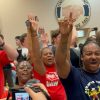By
Basil Wilson
For
Carib News
4/16/14
Mark Wignall, the featured columnist for the Jamaican Observer, on Thursday, April 10, 2014, wrote an interesting column that highlighted the current Member of Parliament for West Kingston, Desmond McKenzie but the column was really about the collapse of the social order in West Kingston.
On Friday, March 28, 2014, a bloody shouting took place at Charles Street and Chestnut Lane that led to the death of a 12 year old boy and a 28 year old man and a number of other residents on that corner received gunshot wounds. The Superintendent for the area, McGregor, and Commissioner Ellington posted eleven names of those they presumed were involved in the shooting on March 28, 2014 and most have already turned themselves in.
In his column on Thursday, April 10, 2014, Mark Wignall points out that in the Seaga era there was a peculiar social order established in West Kingston that encompassed Tivoli Gardens and Denham Town which are JLP enclaves. In the early years of the Seaga era in West Kingston, Jamaica’s political violence originated in that volatile constituency. The sections of Matthews Lane and elsewhere under the control of the People’s National Party were chronically at war with their JLP counterparts.
Prior to the Seaga years of hegemony in West Kingston, no elected official or political party was consecutively re-elected until 1962 when the housing patterns with the construction of Tivoli Gardens provided the JLP with a majority of the votes in the constituency.
During the 1967 election, relationships with politicians and gang members were established. The intra-class tribalism was manifested in the 1967 election and continued until the temporary truce in January, 1978 when “Buckie” Marshall of Matthews Lane and Claudie Massop of Tivoli Gardens turned their swords into ploughshares.
The truce or peace movement spread like a prairie fire throughout Kingston and St. Andrew. Peace dances were kept all over the corporate area to commemorate the peace. The peace movement contained the political violence but it also led to a rise in robberies as thieves now bonded and engaged in skullduggery.
Not long after the Peace Concert in April, 1978, the shaky peace movement fell apart and the election of 1980 was the bloodiest in Jamaica’s history. Prior to the 1980 election, the don of Tivoli Gardens, Claudie Massop, was taken out by the police. Massop was succeeded by Lester “Jim Brown” Coke.
The 1980s was the decade of lucrative drug trafficking and the exporting of Jamaica’s lumpen-proletariat to settle in various inner cities of the “95 corridor” in an attempt to control the booming drug markets.
Politics was still significant but not paramount to organized crime elements that began to take hold in West Kingston. Hustling was not limited to political contracts but now encompassed links to overseas posses and the domestic extortion rackets in downtown Kingston.
In the late 1980s, the United States government crushed the Jamaican Posses including the Shower Posse and many of the leading figures like Vivian Blake and Lester “Jim Brown” Coke were apprehended and received long sentences or as in the case of “Jim Brown” died in a fire on the verge of his extradition to face murder charges in Florida.
A new generation of dons emerged more pre-occupied by profit-making than by tribal politics. The PNP don, “Zeeks” Phipps and the JLP don “Dudus” Coke cleverly ended the age-old political war and paid more attention to dividing up the extortion spoils. The ubiquitous cell phone provided the evidence to convict “Zeeks” for murder and “Dudus” for firearms and drug trafficking for 18 years. The latter is serving his time in a federal prison in the United States.
“Zeeks” and “Dudus” convictions have left a leadership vacuum in West Kingston and the recent mayhem is an attempt by rival factions to establish a new hegemony in particular communities. Power in Tivoli, Denham Town and Matthews Lane is fragmented. Under normal circumstances that would give the state an opportunity to step in and assert control. The old order whether administered by Buckie Marshall, Zeeks, Massop, “Jim Brown” or “Dudus” was dominated by dons known for their cruelty. Among youths in the respective communities, a sub-culture of violence persists and, as was witnessed on March 28, no respect for human life, even for children.
What is obvious is that the criminal lifestyle in Jamaica is quite fleeting. The Coke family has suffered one tragedy after another. There are now three generation of Coke, “Jim Brown” Coke, his sons, “Jah T” and “Dudus” and a third generation popping up whose fate will be similar to the preceding generation. A replication of the same fate is observed in Matthews Lane. “Zeeks” Phipps whose brother “Early Bird” was murdered in yesteryear and sons of the new generation are reluctant to become embroiled in the criminal lifestyle.
Some of the older residents of West Kingston look back with nostalgia on the old “don” order when petty criminals were not able to steal or rape within the community and a particular kind of peace prevailed. The Member of Parliament, Desmond McKenzie, had immense influence over JLP lumpen and he and Paul Burke played a historical role in forging a peace movement in the twenty-first century. McKenzie has not been able to establish that kind of clout in Denham Town or Tivoli Gardens in the present environment.
The state is too dependent on the police to maintain the social order. The old order of donmanship has collapsed and needs to be replaced by vibrant civic associations, women’s groups, youth clubs, church groups, etc. It is not easy, as we have witnessed, for a new wholesome order to be established but it is clear it will not occur by happenstance. The state has to invest resources in these communities and provide space for the cultivation of wholesome leadership. It must be made clear to the new generation of aspiring criminals that there is no long term benefits to criminality.















